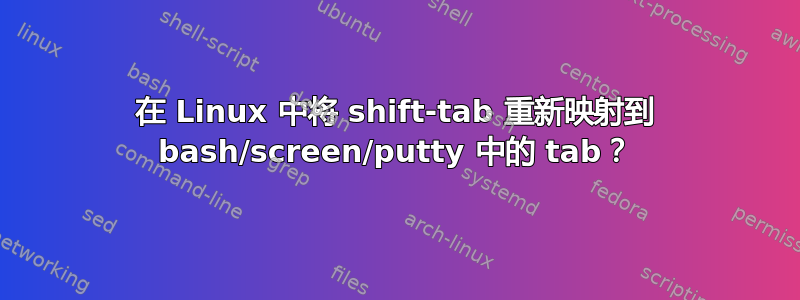
我通过 set -o vi 命令在 bash 中使用 vi 模式。令人恼火的是,当我输入大写单词,然后尝试使用 tab 完成,但没有足够快地释放 Shift 键时,它会让我退出插入模式并进入命令模式。我以为几个月后我会自然地调整并停止这样做,但似乎我不能。
现在,如果有办法将 shift-tab(我怀疑它在任何情况下都没有任何用处)重新映射到常规选项卡,那么我的命令行麻烦就结束了。
我的设置是 Windows -> Putty -> bash -> gnu screen
答案1
我在 Solaris 机器上遇到了同样的问题。
我通过在 .inputrc 文件中添加以下行来修复此问题。
"\e[Z": complete
事实上,这是我从网上某处复制的整个 .inputrc(注意:您需要将模式从 emacs 更改为 vi)文件:
# This file controls the behaviour of line input editing for
# programs that use the GNU Readline library. Existing
# programs include FTP, Bash, and GDB.
#
# You can re-read the inputrc file with C-x C-r.
# Lines beginning with '#' are comments.
#
# First, include any systemwide bindings and variable
# assignments from /etc/Inputrc
$include /etc/Inputrc
#
# Set various bindings for emacs mode.
set editing-mode emacs
$if mode=emacs
Meta-Control-h: backward-kill-word Text after the function name is ignored
#
# Arrow keys in keypad mode
#
#"\M-OD": backward-char
#"\M-OC": forward-char
#"\M-OA": previous-history
#"\M-OB": next-history
#
# Arrow keys in ANSI mode
#
"\M-[D": backward-char
"\M-[C": forward-char
"\M-[A": previous-history
"\M-[B": next-history
#
# Arrow keys in 8 bit keypad mode
#
#"\M-\C-OD": backward-char
#"\M-\C-OC": forward-char
#"\M-\C-OA": previous-history
#"\M-\C-OB": next-history
#
# Arrow keys in 8 bit ANSI mode
#
#"\M-\C-[D": backward-char
#"\M-\C-[C": forward-char
#"\M-\C-[A": previous-history
#"\M-\C-[B": next-history
C-q: quoted-insert
$endif
# An old-style binding. This happens to be the default.
TAB: complete
# Macros that are convenient for shell interaction
$if Bash
# edit the path
"\C-xp": "PATH=${PATH}\e\C-e\C-a\ef\C-f"
# prepare to type a quoted word --
# insert open and close double quotes
# and move to just after the open quote
"\C-x\"": "\"\"\C-b"
# insert a backslash (testing backslash escapes
# in sequences and macros)
"\C-x\\": "\\"
# Quote the current or previous word
"\C-xq": "\eb\"\ef\""
# Add a binding to refresh the line, which is unbound
"\C-xr": redraw-current-line
# Edit variable on current line.
"\M-\C-v": "\C-a\C-k$\C-y\M-\C-e\C-a\C-y="
$endif
# use a visible bell if one is available
set bell-style visible
# don't strip characters to 7 bits when reading
set input-meta on
# allow iso-latin1 characters to be inserted rather
# than converted to prefix-meta sequences
set convert-meta off
# display characters with the eighth bit set directly
# rather than as meta-prefixed characters
set output-meta on
# if there are more than 150 possible completions for
# a word, ask the user if he wants to see all of them
set completion-query-items 150
# For FTP
$if Ftp
"\C-xg": "get \M-?"
"\C-xt": "put \M-?"
"\M-.": yank-last-arg
$endif
# Make Shift-tab act like regular tab - ms4719 - 20120308
"\e[Z": complete


